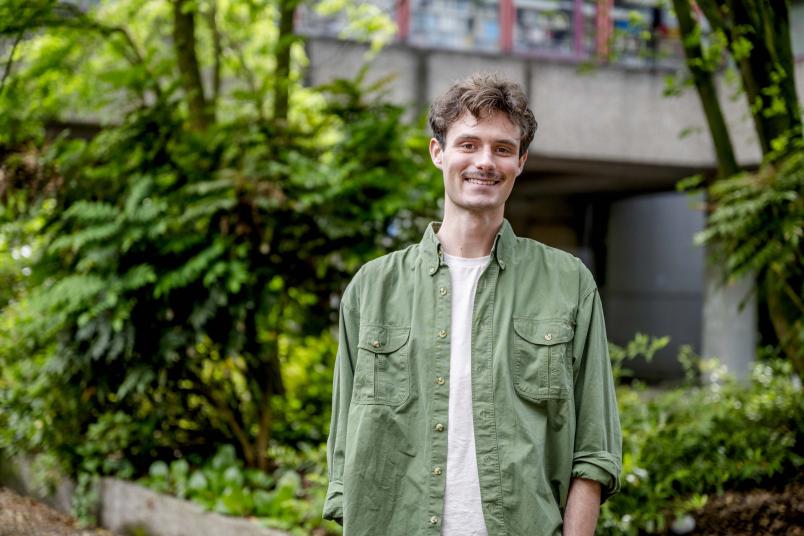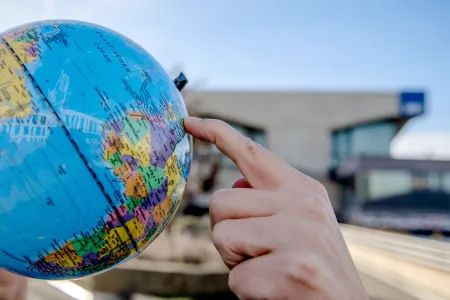
Filip Kuś is pursuing his PhD at the University of Gdańsk in Poland.
Internationalization
“You cannot do science alone”
Filip Kuś has been researching at the Winklhofer Lab of Ruhr University Bochum since April. His research stay is made possible by the prestigious fellowship of the European Molecular Biology Organization (EMBO).
From Gdańsk to Bochum: Filip Kuś has been awarded a fellowship by the European Molecular Biology Organization which enables him to undertake research at Professor Konstanze Winklhofer's lab at the Institute of Biochemistry and Pathobiochemistry at Ruhr University. In an interview, he enthusiastically tells us about his research, the so-called FLIM-FRET microscope and the endless opportunities for international PhD students on and off campus. The doctoral student from Poland moreover stresses the importance of international exchange and collaboration for science. And he reveals, what his favorite location on campus is.
Mr Kuś, what is your PhD project about?
Filip Kuś: At the University of Gdańsk, I work on molecular chaperones. It's a family of proteins that helps to refold or degrade damaged proteins within our cells. These molecular chaperones are absolutely crucial for our body to function and when they stop working properly, it leads to a wide range of diseases from cancer to neurodegeneration - most of these are currently incurable. There are still many things we don’t know about those molecular chaperones, which is why even a small discovery in this field can have a huge impact on society.
What are you working on, while you are here at Ruhr University and in how far does the stay at the Winklhofer lab benefit your research?
At my home university, I focus mostly on biophysical and biochemical techniques and not on cell culture experiments. During my stay here at professor Konstanze Winklhofer’s lab, I work with cells, a common cell line, which I genetically modify, that is I transfect them with a plasmid DNA so that the line encodes for a particular fluorescent protein, which I can then study under the microscope. In fact, I mainly came for the FLIM-FRET microscope, that is the Fluorescence lifetime microscopy (FLIM) and the Förster’s resonance energy transfer (FRET) microscope, which is available at the Winklhofer lab. This sophisticated device allows me to get a lot of valuable data for my project, because I don't have it at my home university. Thanks to this stay, I can validate my findings on a cellular model which, of course, adds to my PhD project.
What other opportunities arise from your stay abroad?
Above all, the stay enables me to network with other scientists in my field, which is extremely important. Nowadays, you cannot do science alone. It's too difficult, you need to collaborate, you need to reach out to experts in other parts of your research field. Of course, obtaining a well-renowned grant is a valuable thing to put on your CV as well.
How did your research stay come about?
A colleague of mine had met researchers from professor Konstanze Winklhofer’s lab at a conference, and because their results were connected to my research area, she told me, that it may be worthwhile for me to reach out for a collaboration. And indeed, when I reached out, it became clear that such a collaboration could result in a valuable and exciting project which prompted me to apply to the European Molecular Biology Organization for funding.
EMBO-Fellowship
EMBO-Fellowship
You have been here for two months now: How do you like it here so far?
Ruhr University is very different from my home university in Gdańsk. The architecture is very brutalist, but for some reason I like it. Also, I very much enjoy the many events available to RUB-students. I signed up for volleyball classes offered by the Hochschulsport and I already attended the Sprachcafé. So there are a lot of things that kind of unite the campus community. I like this very much and I think this is something we really miss at our university.
What is more, I think Bochum is nicely located. Every weekend you can stand in another place in the Ruhr area with another different vibe. Also, I have already made trips to Belgium, to the Netherlands and I'm also planning to go to Switzerland. I think, it's nice that you can easily access different places.
Do you have a favorite place on campus?
I quite like the university library, because I am a fan of architecture that has its own spirit and unique character and the library is definitely one of those places. I just like to sit there sometimes just to enjoy the scenery. I think, it's a perfect place for photographers as well, because of the different angles.
Is there anything that stroke you particularly interesting or surprising, when you first came here?
I was positively surprised by the trust that people have in one's skills. I mentioned earlier that I came here for the advanced microscope. After initial training, I was allowed to use it and people assumed that I have all the necessary knowledge and skills to operate it without their supervision. Of course, whenever I need support, they are there to answer my questions and help me, but they never became overprotective about it. So, I feel that I have freedom to do the stuff that I was trained for.
Will you stay in academia? What do you wish for the future?
I'm not sure at this point, if I want to stay in academia. I think, I will make this decision during the final year of my PhD. Other than that, I've heard someone saying that you have to be careful about what you wish for, because it may happen. And I quite like this way of thinking. This may sound cliché, but I try to focus more on the journey rather than the destination. It helps me to keep flexible with what I plan for the future, which I think really makes life happier as a scientist.
